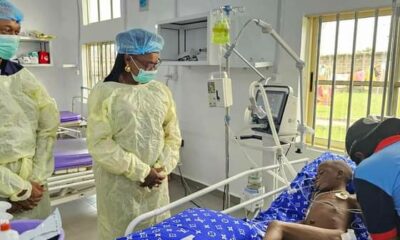GRBusiness
How Nutritious is Your Product?


By Iquo Ukoh, Chief Executive Officer, Entod Marketing Ltd
According to the 2017 Multiple Indicator Cluster Survey a staggering 43.6% of Nigerian children are stunted – not growing at the pace they should. Are you in manufactured Food Business? What is the Nutritional value of your product? Will your product helpto nourish your customers and ensure they remain healthy enough to makerepeat purchases?
The fight against nutritional deficiencies can only be won with a multifaceted approach. It calls for individuals, food producers and the government joining hands together to ensure success.
In the last few years, there has been some heightened level of nutrition awarenessamongst some Nigerians. Primarily as a result of the volume of information that is readily available on the internet.
Despite this, the level of nutrition knowledge amongst the larger percentage of the populace remains low. How do you explain a consumer that says that ‘boiled corn has less carbohydrate than roast corn’? Or a young lady on a reducing diet feasting on fruits and saying ‘I have tried to lose weight but the reading on my scale is not moving downwards’. For this lady fruits are not carbohydrates and so should not affect her weight.
For food producers or manufacturers on the other hand there is a need to consciously ensure that foods meant for consumers provide the required nutrients. In addition they should provide sufficient nutritional information on their product packs, for consumers to make informed food choices.
The mother that buys food for her young child is totally dependent on the producer to ensure that the content of the product she buys will meet the need of her child. We eat a pack of chin-chin or plantain chips and may not be aware of the amount of carbohydrate, fat or saltit contains.
Do food producers know what to do?
Whilst we cannot argue that every business is set out to be financially viable, however, the food producer should approach his/her enterprise from the mindset of a social entrepreneur.
A shift in orientation is what is needed such that it is possible for the producer to achieve both objectives. The starting point therefore is for the food producer to have some nutrition knowledge or get the service of an expert in this area.
This will be one way to ensure provision of nutritious products and communicate clearly the product nutritional benefit on labels.
Observation shows that some producers of packaged goods feed on the poor knowledge of consumers, and therefore make unsubstantiated claims on their product labels. Some others just go with the flow of what is in vogue. How do you explain ‘gluten free’ yam flour?
In the first place gluten only exists in some grains so why put such a claim on a root tuber? In other instances there is no nutrition information to consumers at all on the pack.
So, is this the case of the producer not having the right nutrition knowledge about his/her product and therefore cannot properly label or is there nothing nutritional about the product?
Is there a Consumer knowledge gap?
For many Nigerians the daily contact with nutrition is mainly on food product labels. Nutrition as a subject only starts to be taught in secondary school and even at that it is not compulsory.
Even for those that take the subject in school, it is Home Economics and Nutrition with the former been the greater subject content. No wonder the ability to make informed food choices in adulthood becomes a problem.
Research has shown that a lot of the common food-related ailments like diabetes and obesity can be prevented or the incidences reduced if there is adequate nutrition knowledge. The educational system may have to consider introducing nutrition as a subject right from primary school. There is certainly a gap in knowledge.
Making foods nutritious is possible
Whilst the consumers struggle to understand basic balanced diet the producer should be positioned to provide nutrition information in simple understandable language to guide the consumer in making healthy food choices. It is a responsibility the food producer cannot leave to government food regulatory agencies alone.
As a consumer I want to know what a packet of plantain chips can contribute nutritionally to my daily food intake requirement. Indeed what does it do for me? It is not enough to list out ingredients in quantities I do not understand.
I want to know if your product will help improve my eyesight, help my skin glow or increase my energy level to work. In the case of children’s foods the mum wants to know if the food will promote growth, make the child have strong bones and teeth.
A call for Social Impact
‘How does your product ensure that if consumed, it can contribute to a greater workforce for tomorrow?’ ‘Does your product offer good nutrition, or empty calories?’
As Businesses you control the product, have the reach and can trigger the desires of the consumer, put your assets to good use, you are critical in this fight against malnutrition.
The 2013 Nigerian Demographic and Health Survey indicates that 25% of our women population are overweight/obese. The time is now for food producers especially the small and medium enterprises to act. After all, you cannot claim what you don’t have in your products.
As government and researches identify nutritional gaps and prevalent deficiencies, it is the social responsibility of every food producer to help fill these gaps. Today it is clear that we have issues of micronutrient deficiencies.
Vitamin A, Iron and Zinc are some of the areas that food producers can work on to improve guaranteed consumption by the populace’. Some of these nutrients can be either incorporated in foods by fortification or ensuring the use of food produce that already contains these nutrients.
The work of ensuring a healthier nation and consequently a more productive work force is in our hands.
Mrs. IquoUkoh is the Chief Executive Officer of Entod Marketing Ltd, a dynamic marketing services company purposed to help businesses succeed in West Africa. This article is sponsored by the Scaling Up Nutrition Business Network. They can be reached via [email protected]


The International Monetary Fund has urged Nigeria to revise its ₦54.99 trillion 2025 budget downward in response to weakening oil revenues.
It also recommends continued tight monetary policy and high interest rates until inflation further slows.
These suggestions may appear sound within orthodox economic models, but for most Nigerians, they are a recipe for deeper suffering.
Yes, inflation has decelerated—from an average of 31% in 2024 to 22.97% by May 2025. But that improvement hasn’t reached the dinner table.
Food prices remain brutal. Over 33% of Nigerians are officially unemployed, and more than 130 million people live in multidimensional poverty.
Behind every number is a family skipping meals, a child pulled out of school, or a shopkeeper forced to shutter their store.
One of the most damaging constraints in today’s economy isn’t the lack of money—it’s the inability to access it. Most banks avoid lending to those who need credit most.
When they do, they slap on interest rates of 27% to 30% and demand collateral far exceeding the value of the loan. It’s a system that locks out the very people who could drive recovery.
Credit is the oxygen of an economy. Without it, farmers don’t plant, factories sit idle, and markets shrink.
Former U.S. Federal Reserve Chair Ben Bernanke—an expert on financial crises—once observed that the core problem isn’t always overspending, but when capable people can’t borrow. Nigeria is falling squarely into that trap.
There is a way out. By reallocating just 3% of the national budget—₦1.65 trillion—the government could establish a national loan guarantee fund.
This fund would cover the first ₦10 million in loan risk per borrower, giving commercial banks the confidence to extend credit to those who actually produce.
With an average loan size of ₦1 million, such a move could unlock financing for 1.65 million small-scale farmers, cooperatives, and traders. Even if just two-thirds of those efforts succeed, that’s over a million new jobs.
The revenue return is clear. Increased employment expands the tax base. New businesses generate more goods, services, and local demand. Social safety nets face less pressure. That ₦1.65 trillion doesn’t vanish—it circulates, stimulates, and ultimately strengthens the economy.
Meanwhile, the IMF’s warning about Nigeria’s fiscal deficit possibly rising from 4.1% to 4.7% of GDP amounts to a difference of roughly ₦660 billion. That figure is modest compared to the trillions lost annually to inefficiencies and leakages.
It’s also less than what a single thriving sector—such as agriculture, construction, or telecoms—can contribute if properly enabled.
If austerity deepens poverty and chokes productivity, then even those advocating restraint today will soon label the country “unstable” tomorrow. But the burden won’t fall on spreadsheets. It will fall on people.
Nigeria doesn’t need to blindly follow rigid templates drawn up in distant boardrooms. It needs a tailored approach that empowers its own citizens.
The economy cannot grow if credit is frozen. The people cannot thrive without opportunity. And the nation cannot progress on fiscal neatness alone.
We don’t need applause from global observers. We need access—for those ready to build, employ, feed, and innovate. Let’s open the gates, not seal them.
Abidemi Adebamiwa is the Managing Editor @ Newspot Nigeria
Transport
Enugu Air, CNG Buses, Transport Terminals Take off in May
… Govt set to develop tourist sites, reports SANDRA ANI


… Work starts on Nnamdi Azikiwe Stadium, Awgu Games Village in earnest
The Enugu Air, CNG Mass Transit Programme, and the ultramodern transport terminals all built from scratch by the Governor Peter Administration are to be launched for operation before the second anniversary of the government.
The government has also approved the development of the state’s tourism industry, while total transformation of the Nnamdi Azikiwe Stadium and Awgu Games Village will start in June to get them ready for the National Sports Festival to be hosted by the state in 2026.
These were made known by the Commissioner for Transportation, Dr. Obi Ozor; Commissioner for Culture and Tourism, Dame Ugochi Madueke; Commissioner for Works and Infrastructure, Engr. Gerald Otiji; and Commissioner for Youth and Sports Development, Barr. Lloyd Ekweremadu after the State Executive Council meeting at the Government House, Enugu, at the weekend.
Briefing Government House Correspondents, Ozor said, “We are starting off with the initial three aircraft and two of the aircraft are already on ground. The third one will be on ground by the end of this month. We are hoping to start the commercial operations before the second year anniversary of this administration.
“You have also seen buses for the mass transit programme across the state. 50 of them are already parked at Okpara Square, and an additional 50 will be joining that fleet in the next few weeks. The 100 of them will be going into commercial operations before the end of this month, which is the second year anniversary.
“Also, the bus terminals, two at Holy Ghost, one each at Gariki, Abakpa and Nsukka, will also be commissioned and go into commercial operations before the 29th of May, this year.”
He added that the government planned to bring in the electric and CNG automotive manufacturing plant into Enugu as well as launch in the next 150 days the Enugu Smart Transport Programme, which would see to the injection of over 2,000 electric vehicles.
Also briefing newsmen, Dame Madueke said funds would be invested in the tourism industry in phases.
“We are going to have it in phases. For the first phase, we are having Awhum Waterfall, Nsude Pyramid where we are going to have the first canopy walkway in the South East. It measures about 600 metres, which will actually be the longest in Nigeria.
“We also have Ngwo Pine Forest where we are having the first zipline in Nigeria. The zipline will measure about 300 metres. In the same Ngwo, we will have a big rotunda and a smaller rotunda. We have the Cross of Hope to be located at Okpatu. The Cross of Hope will be sitting 580 metres above sea level and the cross itself will measure about 50 metres, making it a total of about 630 metres above sea level. The cross will have about 15 floors with a lift.
“At Awhum Waterfalls, we are going to have another canopy walkway and a boardwalk to preserve the ecosystem.
“We equally have the Akwuke/Atakkwu Waterpark and Ovu Lake Golf and Resort at Akpawfu,” she stated.
She explained that all the tourist sites would have experience centres, food courts and renewable energy, adding that tour buses would soon arrive to ensure ease of movement of tourists.
Ahead of the 23rd edition of the National Sports Festival, Enugu 2026, Barr. Ekweremadu said the State Executive Council had equally directed the commencement of work both at the Nnamdi Azikiwe Stadium and Awgu Games Village not later than June.
“We also briefed the council on the progress made in establishing a Lab for Animation for young people in Enugu State, which His Excellency will be commissioning soon. The lab is ready.
“We are similarly working towards empowering over 2,100 young people across the state, who were trained around December last year. This empowerment will be coming up on the 12th of August, being the International Youth Day’” Ekweremadu concluded.
Energy
NNPC, Dangote Strengthen Strategic Partnership
Bot partners reaffirmed commitment to Healthy Competition Towards National Prosperity, reports SANDRA ANI


As part of ongoing efforts to promote mutually beneficial partnerships and foster healthy competition, the Nigerian National Petroleum Company Limited (NNPC Ltd.) and Dangote Petroleum Refinery & Petrochemicals (DPRP) have pledged to deepen collaboration aimed at ensuring Nigeria’s energy security and advancing shared prosperity for Nigerians.
This commitment was made during a courtesy visit by the President/Chief Executive of Dangote Group, Mr. Aliko Dangote, and his delegation to the Group CEO of NNPC Ltd., Mr. Bashir Bayo Ojulari, and members of the company’s Senior Management Team at the NNPC Towers, on Thursday.
During the visit, Dangote pledged to collaborate with the new NNPC Management to ensure energy security for Nigeria.
“There is no competition between us, we are not here to compete with NNPC Ltd. NNPC is part and parcel of our business and we are also part of NNPC. This is an era of co-operation between the two organizations.” Dangote added.
While congratulating the GCEO and the Senior Management Team on their “well-deserved appointments,” Dangote acknowledged the enormity of the responsibility ahead, noting that the GCEO is shouldering a monumental task, which he expressed confidence that, with the capable hands at his disposal in NNPC, the task is surmountable.
In his remarks, the GCEO, Mr. Bashir Bayo Ojulari assured Dangote of a mutually beneficial partnership anchored on healthy competition and productive collaboration.
Ojulari highlighted the exceptional caliber of talent he met in NNPC Ltd., describing the workforce as a dedicated, highly skilled and hardworking professionals who are consistently keen on delivering value for Nigeria.
Expressing the company’s readiness to build a legacy of national prosperity through innovation and shared purpose, Ojulari said NNPC will sustain its collaboration with the Dangote Group especially where there is commercial advantage for Nigeria.
Both executives also committed to being the relationship managers for their respective organisations through sustained productive collaboration and healthy competition, thereby envisioning limitless opportunities for both organizations.






















